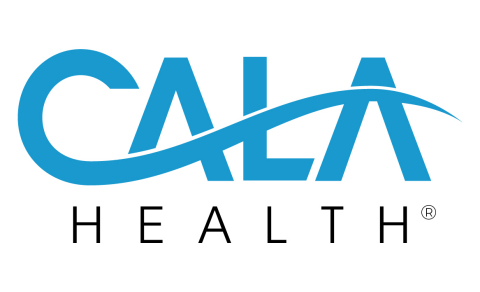Cala Health Receives FDA Breakthrough Device Designation for Cala Trio™ Therapy to Treat Action Tremors in Parkinson's Disease
Cala Health Receives FDA Breakthrough Device Designation for Cala Trio™ Therapy to Treat Action Tremors in Parkinson's Disease
-- Subsequent clinical trials expected to commence in 2020 --
BURLINGAME, Calif.--(BUSINESS WIRE)--Cala Health, Inc., a bioelectronic medicine company developing wearable therapies for chronic disease, announced that the U.S. Food and Drug Administration (FDA) has granted Breakthrough Device Designation to Cala Trio™ for the treatment of action tremors in the hands of adults with Parkinson's disease. Cala Trio is currently FDA-cleared to relieve hand tremors from essential tremor (ET). The Company expects to initiate the next clinical trials evaluating the therapy in the treatment of action hand tremors in patients with Parkinson's disease by the end of 2020.
Breakthrough Device Designation is granted to specific medical devices that have the potential to provide a more effective treatment for life-threatening or irreversibly debilitating diseases. The goal of the Breakthrough Devices Program is to provide patients and health care providers with timely access to these medical devices by speeding up their development, assessment, and review while preserving the statutory standards for premarket approval, 510(k) clearance, and De Novo marketing authorization.
"While hand tremor in patients living with Parkinson's disease typically occurs when the arm is at rest while sitting or walking, it is also estimated that more than half of patients also experience action tremor, which occurs when the arm is being used to perform an activity or task," said Stuart Isaacson, MD, Director of the Parkinson's Disease and Movement Disorders Center of Boca Raton in Florida. "Furthermore, published data suggest that levodopa, the primary treatment for motor symptoms of Parkinson's disease, is not usually effective in treating this type of tremor, which can negatively affect performing daily tasks like eating and writing. For this reason, treatment for action tremor in patients with Parkinson's disease remains a significant unmet medical need that impacts their daily activities and overall quality of life."
Cala Trio, a non-invasive targeted therapy, is currently available in the U.S. by prescription. Cala Health sought Breakthrough Device Designation for Cala Trio because many patients with Parkinson's disease experience the same action tremor as patients with essential tremor.
The Company expects to initiate the next clinical trials of Cala Trio virtually in patients with Parkinson's disease in 2020. Physicians and their patients with Parkinson's disease-related action hand tremors interested in participating in research are encouraged to visit https://calahealth.com/research/. Virtual clinical trials will allow participants to volunteer from home, using the therapy as indicated in the study design and having telemedicine visits with a neurologist throughout the study.
"Cala Health is committed to pursuing rigorous scientific and clinical research to demonstrate the mechanism, benefits, useability, and safety of our technologies," said Kate Rosenbluth, Ph.D., Founder and Chief Scientific Officer of Cala Health. "We are pleased to have the FDA recognize the novelty and potential for our wrist-worn neuromodulation therapy."
About Action Tremor
Action tremor occurs with the voluntary movement of a muscle. Most types of tremor are considered action tremor. There are several sub-classifications of action tremor, many of which overlap.1 Patients with both Essential Tremor (ET) and Parkinson's disease (PD) often present with tremors during muscle contractions, including during intentional activities such as while hands are outstretched from the body ('postural tremors') and when hands are in motion during tasks ('kinetic tremors').
About Essential Tremor (ET)
Essential Tremor (ET) is the most prevalent tremor disorder and one of the most common neurological disorders, affecting an estimated seven million people in the United States. It is a chronic condition that causes involuntary and rhythmic shaking and typically worsens over time. ET can affect almost any part of the body, but the trembling most often occurs in the hands, making everyday activities such as eating, writing, or getting dressed extremely difficult. ET is often confused with Parkinson's disease, although it is eight times more common. Current ET treatments include mostly off-label use of medications or brain surgery.
About Cala Trio™
Cala Trio is the first non-invasive targeted therapy that reduces hand tremors for adults living with Essential Tremor (ET). Prescription therapy is a simple, wrist-worn device that is calibrated to treat a patient's unique tremor symptoms. When activated, Cala Trio gently stimulates the nerves in the wrist to disrupt the tremulous activity in the brain, without the need for invasive brain surgery or medication. The easy-to-use and effective Cala Trio can be prescribed through an in-person consultation or telemedicine appointment. Therapy is conveniently delivered to the patient's home, and Cala Health educates patients based on how they learn—phone, video, user portal.
About Cala Health, Inc.
Cala Health, an award-winning bioelectronic medicine company, is transforming the standard of care for chronic disease while putting patients first. The Company's wearable neuromodulation therapies merge innovations in neuroscience and technology to deliver individualized peripheral nerve stimulation, and its vertically integrated commercial model is reshaping the delivery of prescription therapies. Cala Health's lead product, Cala Trio, is the only non-invasive, wrist-worn prescription therapy for essential tremor. New therapies are under development in neurology, cardiology, and psychiatry. Cala Health is headquartered in the San Francisco Bay Area and backed by leading investors in both healthcare and technology. For more information, visit CalaHealth.com.
1Crawford P, Zimmerman EE. Differentiation and diagnosis of tremor. Am Fam Physician. 2011 Mar 15;83(6):697-702. PMID: 21404980.
Contacts
Erich Sandoval
Erich.Sandoval@FinnPartners.com
